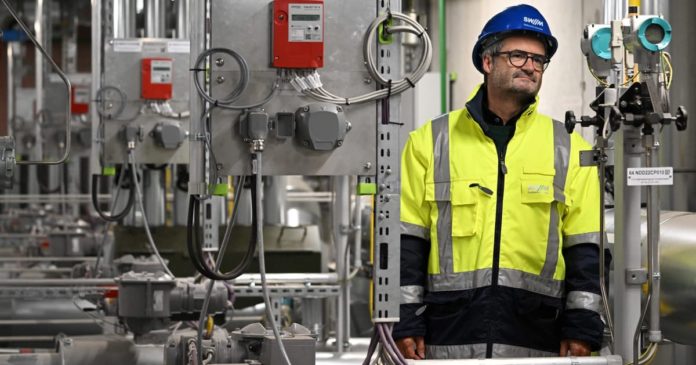Press play to listen to this article
Voiced by artificial intelligence.
Teresa Ribera is Spain’s Minister for the Ecological Transition of Spain and Vice President of the Government of Spain.
The opening days at COP28 have left us in little doubt about the inadequacy of emissions reduction measures to meet the Paris Agreement climate goals — the warnings from the World Meteorological Organisation and UN secretary-general have been stark.
The challenge facing us in Dubai is steep. But there is no doubt about the positive effect that the gradual reduction of fossil fuels will have on climate security when replaced with the rapid phase-in of limitless solar and wind energy.
Clean energy sources are shattering growth records and reshaping the global energy economy, yet phasing out fossil fuels and its schedule is one of the most controversial issues on the agenda in Dubai. Resistance remains strong despite the available alternatives. Why?
Some point to the concern many countries may have about the impact such a commitment could have on energy supply security or consumer prices.
Newly installed solar and wind have already saved EU consumers €100 billion during 2021-2023 by displacing expensive fossil fuel generation. During the year following Russia’s invasion of Ukraine, €12 billion was saved on gas import costs due to solar and wind power growth.
The trend to to solar and wind trend is accelerating. Germany, Spain and other European countries will likely see wind and solar PV produce over 40 percent of their electricity in 2024.
Both domestic and industrial consumers can enjoy immediate benefits. For example, solar roof panels allow consumers to reduce their bills.
The importance of a clean energy switch is reflected in the U.S. and China Sunnylands statement ahead of these climate talks, with the aim of tripling renewable energy capacity globally by 2030.
This comes against the backdrop of China building solar and wind at record speed, ahead of all countries, which could lead to structural decline in its carbon dioxide emissions. The U.S.’s huge national investment package under the Inflation Reduction Act is now leading to wind turbine manufacturers reopening and expanding factories, creating new jobs across the country.
Complex changes are already underway in our energy system that do not have to mean higher consumer costs or energy shortages if the right policies are backed by major investment measures.
Policy and investment that support renewable energy driven by solar and wind, electrification and energy efficiency remain the most suitable ways of providing energy supply stability and affordable prices for consumers.
Redirecting subsidies from fossil fuels towards solar and wind can help ease the cost of living crisis, along with climate and environmental risks, which is necessary for the smooth functioning of the global economy.

New analysis shows that building new electricity grids could save trillions of dollars, allowing clean energy to be supplied efficiently within and between countries. The development of sustainable supply chains will also require global cooperation.
This will demand more investment in networks and storage, different raw materials, and new skills but also represents a new opportunity to promote employment, innovation, and cooperation between countries and companies seeking co-development and benefits for local communities.
It is true that the transition requires a different financial system in which public development banks and the insurance industry play a special role as advocates of change and guarantors of new investment. But it is an exercise worth doing, making transformation feasible by facilitating long-term financing and bringing economic, social, and environmental benefits closer to the moment when the new energy infrastructure is operational.
Technically and economically, the change makes sense and is easier to activate from the commitment of a global agreement.
On the ground, it is also essential to keep public policies focused on the new needs for job qualifications and the potential transient impact that changes may have on vulnerable workers and consumers to ensure a fair and equitable change.


